
Recently, the research group led by Dr. WANG Junfeng at the High Magnetic Field Laboratory, the Hefei Institutes of Physical Science of the Chinese Academy of Sciences, revealed significant physiological and molecular effects of a 7 T strong magnetic field on magnetotactic bacteria, based on experiments conducted with the laboratory' s superconducting magnet platform.
The related findings were published in Applied and Environmental Microbiology.
Strong magnetic fields, widely used in advanced materials research and 7 T magnetic resonance imaging, may pose unclear biological effects and risks. Due to the complexity of organisms and lack of known magnetic sensing systems, these effects are hard to study. Magnetotactic bacteria, with natural magnetic sensitivity and simple structures, provide an ideal model for exploring magnetobiological mechanisms.
In this study, the team conducted a systematic investigation into the effects of a steady 7 T magnetic field on Magnetospirillum gryphiswaldense MSR-1, focusing on growth, magnetosome biomineralization, and gene transcription.
The results showed that exposure to the strong magnetic field significantly accelerated bacterial growth and increased the total number of magnetosomes, while the average crystal size of individual magnetosomes remained unchanged. Transcriptomic analysis further indicated substantial upregulation of genes associated with denitrification enzymes, suggesting that nitrogen metabolism plays a key role in bacterial adaptation to high-field conditions. Complementary proton transfer reaction–mass spectrometry analysis supported these findings by detecting variations in intermediates such as NO and N₂O, confirming that denitrification activity was enhanced under 7 T magnetic field exposure.
This study not only provides new experimental evidence for the biological effects of strong magnetic fields on magnetotactic bacteria but also highlights the critical role of nitrogen metabolism in microbial adaptation to extreme magnetic environments.
The research was supported by the National Key Research and Development Program of China, the National Natural Science Foundation of China, and the Natural Science Foundation of Anhui Province.

MSR-1 growth acceleration under 7 T magnetic field (Image by MA Kun)